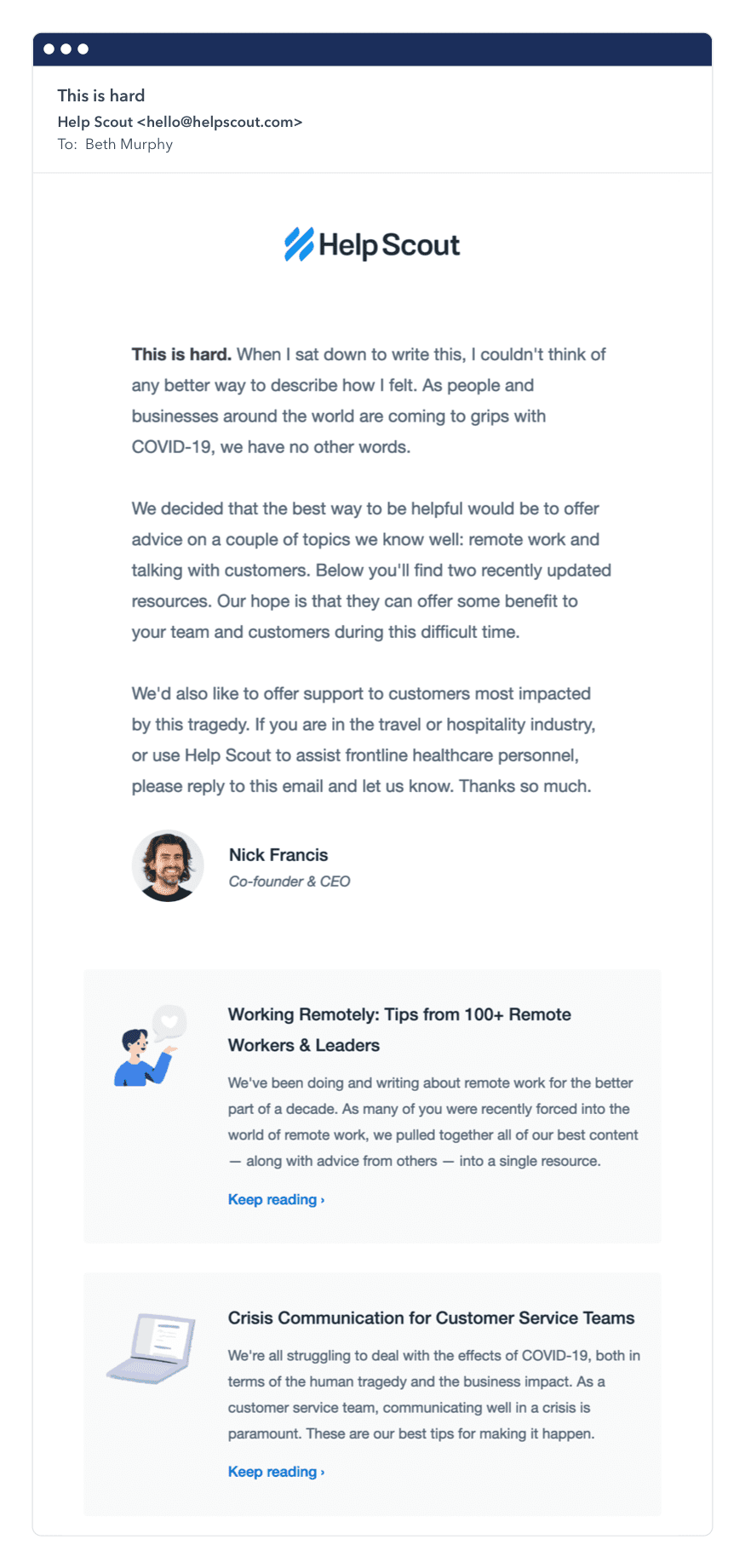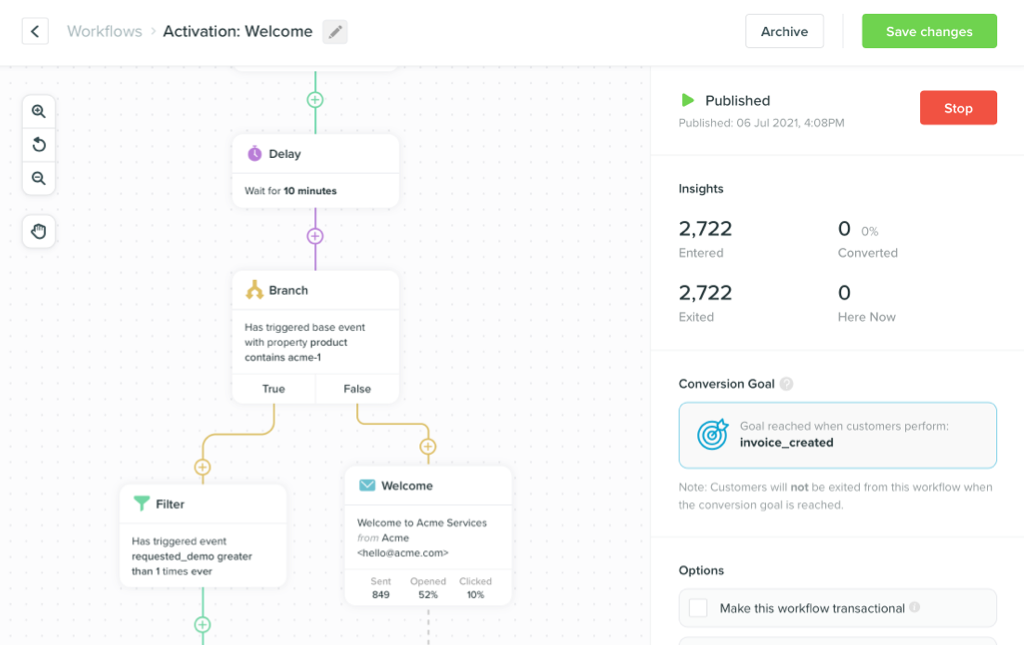
Coronavirus messaging trends: Things to keep in mind
-
Messaging and AutomationUpdatedPosted:
On this page
Customer messaging is at the front line when it comes to communicating with and informing customers.
This puts us in a unique position to observe some early trends we’re seeing, given the huge impact of Coronavirus across the world over the last few weeks.
Many are wondering how other businesses have adapted their messaging to what works or what is taboo.
Things to keep in mind
We believe that in a time of uncertainty and isolation, customers ultimately want genuine interactions and are wise to marketing attempts that take advantage.
This comes down to showing empathy and understanding your customers.
The course of everyone’s feelings will change over the coming days as we will all experience the health, emotional and financial impacts of the situation differently.
As new routines emerge, many will also understand the need to support business through this period, knowing that many businesses are and will be suffering.
Early trends by impact
The impact of the pandemic seems to fall into these categories:
- Businesses affected immediately due to changes in government regulation (travel, events, local)
- Businesses that might be affected by changing economic consumer sentiment (discretionary consumer retail or services).
- Businesses that are likely to remain unaffected due to their critical nature (utilities, food, etc.)
- Businesses that may grow as a result of changes in consumer behaviour (delivery companies, software that support remote collaboration, etc.)
The below graph from Neil Patel shows ups and downs in traffic across industries.
So everyone is affected. What should businesses do next to ensure they’re communicating with customers effectively?
1. Keep communicating changes, important and helpful information
Amidst the uncertainty, one thing is sure: Keeping your customers up to date on changes is vital. This could range from keeping customers informed on changes to opening hours, delivery services, shipping times, support volumes, or any service interruptions.
It’s worth noting that: “What we’re doing in response to Coronavirus” emails appear to have reached its limit, so emailing only necessary information based on hard changes will likely have the biggest impact.
2. Messaging that supports your product is still vital
Automated messages that support your product experience should, for the most part, go on as normal.
Whether your business is experiencing changes, challenges or growth, customers will expect the same experience and information they always would.
Keeping your BAU humming will be vital to efforts to survive these turbulent times.
3. If your product or service can genuinely help, make people aware
We’ve seen a lot of emails that are tastefully informing people about products that can help them in their new routine.
Whether this is working from home, entertaining yourself and your family, caring for loved ones, looking after your health, etc.
The key here is genuinely. If your product really can help solve people’s problems right now, then you should get it in front of customers.
As long as it is truly valuable, the content will be well received.
4. If your business is suffering, reach out to your supporters
We’ve seen a huge amount of emails transparently sharing their journey and hardships. We’re all in this together and sharing honestly and asking for support might help your business stay alive. In times like these, being upfront and sharing your story will be well received by those customers loyal to your product or brand.
What not to do
A few things we’d advise to steer clear on:
- Don’t act like everything’s normal. It’s not!
- Don’t be blind to the fact that people have a lot to deal with right now the next few months for some may be a fight for survival.
- Don’t forget that we’ll all experience this pandemic in different ways in our health, emotionally and financially.
Early trends by vertical
Here are some quick one-liners on early trends we’re seeing by industry, though things are developing quickly from day to day.
1. Consumer retail
From an online sales point of view, retail (consumer goods) is still largely operating BAU. Given that emails are such a strong revenue driver, there is a heavy focus on email marketing within this space.
Additional sale offers are being released to bolster the bottom line as brands become nervous about spending patterns in the next couple of months.
To circumvent this, businesses could create a stock refill workflow that will send customers an email when their favorite items are now restocked and available for purchase in their local stores.
The below example from book seller Dynmocks reminds customers that they’re still open for business.
2. Consumer services: finance, insurance, utilities, entertainment
Those that enable customers during this period of significant change will win big.
Some include online education, video streaming, delivery services, fitness and gaming. Those that enable our day-to-day way of life should weather the storm fairly well too.
The below example from TED curates a list of relevant talks that their users might be interested in watching.
3. B2B SaaS and software
With the magic of recurring revenue, this industry is focused on retention.
Sales teams are starting to funnel resources to customer success and building brand equity through helpful online content, which has been a focal point for a lot of these businesses.
The below email from HelpScout is heartfelt, and also shares content that is relevant and helpful.
4. B2B services
With the widespread cancellation of in person events like tradeshows, leading to billions of dollars lost, B2B services are looking to digital marketing more than ever.
Digital marketing swoops in as a remote option, and also because it is measurable, where marketers can easily get a snapshot of their ROI.
The below email from Starling Bank is focused on reassuring customers in an uncertain time.
What Vero is doing
We’re trying to take the path of “being helpful.” Information that helps you be successful, particularly when the landscape is changing so dramatically, is always worth sharing.
We know that certain sectors will be impacted heavily by the current pandemic, and we’ll soon be sharing tips on how to audit your Vero account to maximize the ROI on your spend.
As always, if you have any questions at all about your Vero account, your strategy, pushing out critical campaigns or anything else, we’re here to help. Please get in touch at support@getvero.com.
The pandemic we’re experiencing is unprecedented in our lifetime, so making good decisions based on the data at hand with the principles above in mind is all we can do.
Communicate genuinely and let’s all look after each other.
Want to send more personalized mobile and email messages to your users?
Learn moreCustomer story

How UNO uses email marketing from the data warehouse to deliver personalized mortgage broking






